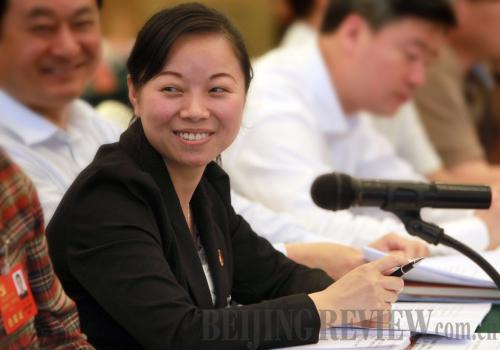|
 |
|
COURAGE SHINES: Wu Juping, who caught a falling toddler from a high-rise building in her arms, attends the 13th Zhejiang Provincial Congress of the Communist Party of China on June 7 (CNSPHOTO) |
According to a report by People's Daily, among the selected provincial-level Party committee members, 118 were born in the 1960s, accounting for 29.28 percent of the total number.
"The age distribution is in line with our country's cadre promotion system, according to which provincial-level officials are supposed to be around 50," said Gong Weibin, a professor at the Chinese Academy of Governance (CAG).
The CPC standing committees of Xinjiang Uygur and Tibet autonomous regions have the largest number of leaders born in the 1960s, with seven each. Normally, a provincial standing committee has 12 or 13 leaders.
Wang Yukai, another professor with the CAG, said the difficulties and challenges that younger officials face in ethnic regions can help improve their decision-making ability.
Zhang Xin, an associate professor of public management at Renmin University of China, said a younger leadership might be much more competitive in facing future challenges.
"Younger officials will be quick in learning and adapting to the fast changing environment. That's an essential quality for advancing the country's reform efforts. They are expected to spearhead some experimental programs in that regard," Zhang said.
Liang Yanhui, a professor at the Party School of the CPC Central Committee, said the rising number of leaders born in the1960s could bring an increase in innovative ideas.
Meanwhile, 74.4 percent of the 404 provincial-level Party committee members hold master's degrees and 24 percent hold bachelor's degrees.
Most noticeably, seven out of the 13 members of the CPC Standing Committee of Tianjin Municipality hold doctor's degrees in management, economy, law or culture.
"Undoubtedly, the trend is that more senior degree holders from top universities will bring their expertise into management," said Wang Guixiu, another professor at the Party School of the CPC Central Committee.
Gong said that due to the massive advances in the higher education sector since the reform and opening-up, the new generation of cadres had the chance to enjoy better education, noting that China's further development calls for administrators that have more professional experience in public governance and economic management.
Yang Yue, 44, the Party chief of Fuzhou, southeast China's Fujian Province, is the youngest person to become a member of the provincial-level Party committee, with a background in engineering.
Sun Zhengcai, 49, Party Secretary of northeast China's Jilin Province, once worked as a researcher at Beijing Academy of Agriculture and Forestry Sciences, and was editor in chief of the book Research on Corn Growing in 50 Years.
Sun has benefited from his strong background in a province that is a major producer of grains.
Zhu Congjiu, 47, who holds a master's degree of business administration specializing in banking, and once served as the chairman's assistant of the China Securities Regulatory Commission, was assigned in late May to east China's Zhejiang Province as a vice governor overseeing the finance sector.
Similarly, Tan Zuojun, former head of the China State Shipbuilding Corporation, was transferred to oversee Liaoning Province, the heavy industry and shipbuilding base in northeast China.
The smooth leadership transition of local Party committees is a key step in paving the way for a smooth leadership transition in the 18th CPC National Congress, said Gong, adding that putting state-owned enterprise executives in important positions has shown that the new central leadership will continue to focus on the country's economic development.
"They can bring their useful experiences accumulated in managing an enterprise into social management and use their expertise to boost the local economy," he said.
"The reshuffle is adapted to the future development of the CPC. It guarantees that the Party has the best talents to ensure governing capabilities and performances," Gong added.
Representing people's will
As representatives of the CPC members, the delegates to the 18th CPC National Congress should be the best Party members from all walks of society with advanced political performance, as required by the CPC Central Committee.
"The CPC National Congress is first of all a festival for Party members, as it provides the highest platform for them to enjoy democratic rights and to participate in public affairs," said Cai Zhiqiang, a professor with the Party School of the CPC Central Committee.
In an effort to better represent its members, the CPC pledged to include more delegates from Party organizations at lower levels, such as migrant workers, at the upcoming congress.
The minimum proportion of grassroots delegates will be 32 percent, two percentage points higher than that at the previous congress in 2007, while the maximum proportion of leaders at various levels will be 68 percent, two percentage points lower than that in 2007, the Organization Department of the CPC Central Committee said.
| 